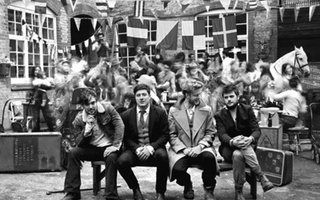After almost two hours of irreverent jokes, meandering plotlines, and tiptoeing around the issues that it seeks to confront, “Sons of the Prophet” reaches its climax at a school board meeting. Star football player Vin (Jonathan Louis Dent), whose prank resulted in the death of the protagonist’s father, trots on stage to deliver an apology. But three-quarters of his mumbled plea consists of a quote from The Doors. “We just wanted to hear your own words!” complains one onlooker. This evasion unfortunately characterizes Stephen Karam’s new play in its entirety: while the laughs come just as thick as they did in his debut, “Speech & Debate,” “Sons of the Prophet” fails to engage fully with both its nascent plot and its underlying themes. The Huntington Theatre’s production, which runs until May 1 at the Boston Center for the Arts, cannot overcome the deficiencies of Karam’s source material despite technical excellence and a pair of standout performances.
“Sons of the Prophet” follows two brothers, second-generation Lebanese immigrants to rural Nazareth, Pa., as they cope with the death of their father in a prank-induced car crash. The older Joseph (Kelsey Kurz), who suffers from a mysterious dilapidating illness, and the younger, Converse-sporting Charles (Dan McCabe) are both gay, and as the story progresses it tangentially confronts questions of sexuality and religion, immigration and racism, and football obsession in rural America. The play’s essential flaw is that it doesn’t treat these issues thoroughly enough. Faced with an embarrassment of thematic riches, Karam squeezes a few laughs out of his chosen issues but little else. “You should feel lucky you have a central nervous system for your body to attack,” jokes Joseph in imitation of his father, but until the totally unprecedented explosion at the school board meeting, the play doesn’t dig much deeper.
One consequence of this superficiality is a lack of development in the characters—a problem that may partially explain several rather flat performances. In potentially emotionally loaded roles, Kurz and McCabe deliver their jokes with panache but struggle with more dramatic aspects. With the exception of one or two shouting matches and a final scene in which Joseph quietly breaks down in physical therapy, neither displays much feeling at all, though whether this is due more to the actors themselves or to Karam’s refusal to flesh out his characters is unclear. In contrast, the older members of the cast turn in scene-stealing performances. Best of all is Joanna Gleason as Gloria, Joseph’s lonely, clueless boss. Whether confusing Hamas and Hezbollah or telling her son, “I don’t want to scare you but I’m afraid I might do something awful,” she adeptly conveys a woman on the edge of a nervous breakdown. Yusef Bulos as the brothers’ uncle Bill also impresses with a combination of borderline racism and righteous anger about his brother’s untimely death. His direct, deeply un-PC proclamations keep the play from drifting too far from its dramatic center.
The Huntington’s production benefits from strong technical elements. From a jolting opening sequence simulating the car crash to the penultimate school board meeting scene—which transforms the entire theater into a school auditorium and has various characters emerge from the front row to take the stage—innovative staging keeps the audience engaged when the directionless plot cannot. Subtle but effective lighting also helps keep order when the stage fragments into multiple simultaneous interactions. Expressive piano riffs somewhat cursorily fill the gaps between the scenes, but with that single exception the production staff do as much as possible to marshal the scattershot “Sons of the Prophet.”
They can’t do it alone. The cast too makes a valiant effort, but ultimately all are hamstrung by ponderous plot development, jokes that—uncharacteristically for Karam—skirt the issues at hand, and ultimately a lack of dramatic courage. The play itself, not the production, is an exercise in unfulfilled potential.
—Staff writer Daniel K. Lakhdhir can be reached at daniel.lakhdhir@college.harvard.edu.
Read more in Arts
‘Godot’ Makes the Waiting WorthwhileRecommended Articles
-
Behold, Cold Breakfast Stinketh!In 1766, before the House system, before “cage-free eggs,” before the very forging of the United States of America, Harvard students rose up to stand against injustice in the dining hall.
-
 Mumford & Sons Build a Tower of Cliche and Insincerity
Mumford & Sons Build a Tower of Cliche and Insincerity -
Former Professor Accused of Swindling Harvard HopefulsZimny claimed that making major donations to Ivy League universities would be crucial in positioning the Chows’ sons for admission, the suit claims. He offered to serve as a middleman who could make a donation on their behalf.
-
The Utility of Race JokesWe need a practical solution to racism, and race-based humor and embracing stereotypes is a great way to conquer racism.
-
Mumford & Sons Headline Crowd Pleasing ConcertFeel-good show relies on folksy charm
-
Women Are Not a Punch LineThe issue with these claims is that nothing is objectively funny; certain things can really only be funny to people who have certain kinds of privilege.













